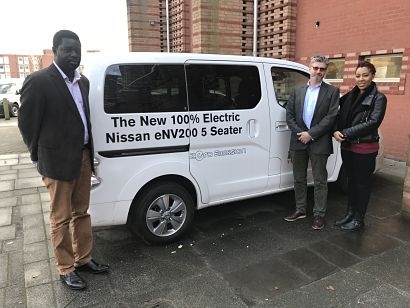
The vehicle has been tested for an off-grid community in The Gambia and will be shipped to the village of Manduar where the charity Global Hands has established a Community Development Hub, partly built by DMU students and staff. The solar carport will be located at the Hub and local drivers will be recruited to operate the taxi service.
“We wanted to help after speaking to taxi drivers in The Gambia and hearing how they spend 50 to 60 percent of their money on buying fuel” said Dr Momodou Sallah, Reader in Globalisation and Global Youth Work, who described the project as a ‘collaboration of engineering and social science’. “We have the knowledge and expertise to provide Africa’s first solar-powered taxi service” Sallah said. “Every mile the taxi travels will have 100% zero emissions. Not only will it be great for the environment, it will also change people’s lives. This will make a real difference to the community. We found out what the local problems were and we are working to solve them. We are doing something that can help and we are being driven by the people.”
Dr Sallah added that there is such a buzz about this happening. The community is thrilled and everyone in the community is waiting to see the taxi for themselves.
The vehicle itself was donated by Nissan and the solar panels donated by Sharp. The panels are well-suited to warmer climates as they have ‘water jackets’ to cool them down. This improves their efficiency while also providing hot water. The vehicle will also be fitted with equipment to capture and store crucial data such as mileage, speed and the charge of the battery.
Dr Sallah leads two study visits a year to The Gambia through #DMUglobal to teach students about globalisation and addressing community need. DMU students and staff have been visiting and fundraising for the Global Hands Manduar Development Hub since 2012. They recently donated books and computers to the Hub’s library, which is the second largest in The Gambia.
The DMU academics plan to create a ‘Living Lab’ at The Hub where they will work with local people to develop appropriate technologies for energy storage, sustainable buildings, cooking, food processing and transport. Using data from the solar taxi pilot project, they also hope to catalyse the development of a low-carbon transport industry across Africa and other developing countries.
Image: De Montfort University
For additional information:

